The primary purpose of a nonprofit company is to help a certain cause.
These organizations' missions usually differ from those of traditional businesses.
If you operate a nonprofit business, I commend you. It's great to see entrepreneurs helping other people and providing aid to charitable organizations.
But just because your motive for running your business is to help a greater cause doesn't mean you shouldn't be trying to generate a profit.
At the end of the day, your nonprofit organization is still a business. From a business perspective, this company needs to be run with the same principles as every other company.
You need to keep up with the latest marketing trends. Research your industry, and analyze your competition.
Learn about the wants and needs of both your customers and donors.
I see this problem all too often when I'm advising nonprofit companies. They are still operating the same way they were 20 years ago.
Sure, they might have a website now, but they aren't always using the most recent technologies.
For example, check out these numbers related to nonprofit organizations and mobile devices:
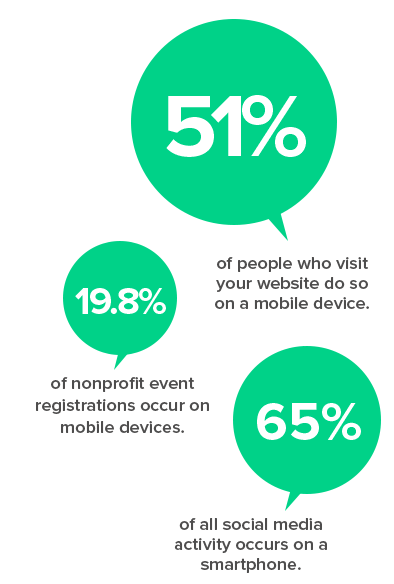
Times have changed. Your nonprofit needs to adapt if you want to survive and thrive.
If your nonprofit company is struggling or could use some fresh ideas, you're in luck. I'll explain what you need to do to boost profits for your nonprofit.
If you've been operating for a while, you probably have a solid base of customers and donors. That's great news and something to be proud of.
But what steps are you taking to continuously grow this number?
Relying on the same customers isn't a sustainable business model.
If you rely on mass direct mail or cold calling houses for donations, I'm guessing you're having trouble acquiring new customers.
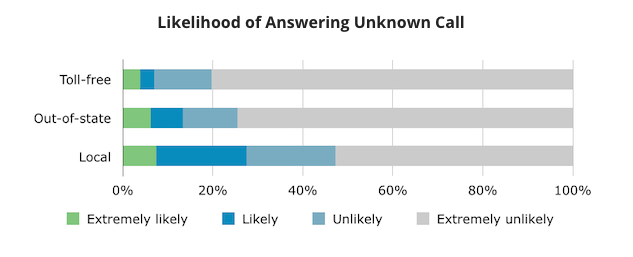
That's because people are not very likely to answer the phone if they don't recognize the number.
Just 7% of people say they'll answer a toll-free call from an unknown number.
Furthermore, research shows that the average conversion rate for cold calls is roughly 2%.
With such a small percentage of people answering their phones and an even smaller percentage actually converting, those numbers aren't appealing.
You need to find other ways to promote your brand so that it can be exposed to the widest possible audience:
These are the types of tactics you need to implement if you want to get more customers and donors. We'll discuss these concepts in much greater detail as we continue through this guide.
Your website needs to be the top priority for your nonprofit organization and your marketing efforts.
We're living in a digital age, and you need to recognize that the best way to get discovered is through the Internet.
But just having a website isn't enough. You need to make it as easy as possible for visitors to buy and donate through this platform.
It's imperative you have a clear call-to-action on each page of the website. This will be the best way for you to generate donations and ultimately increase your profits.
Here's a great example of this concept on the Habitat for Humanity homepage:
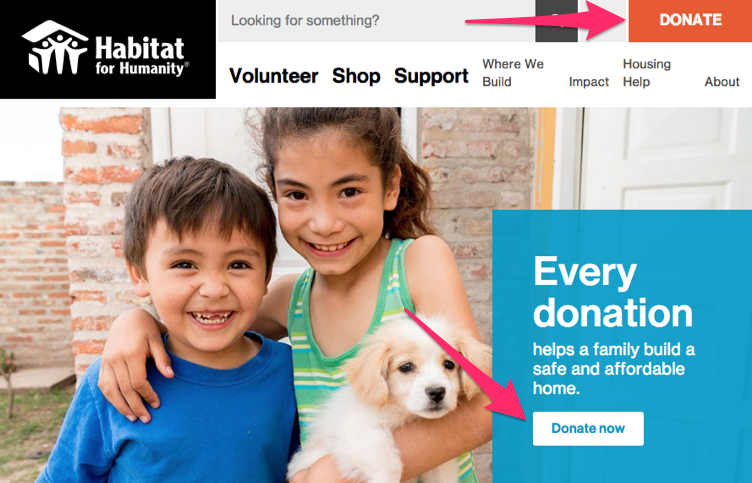
As you can see, the "donate" CTA buttons are clearly displayed in several places on the site.
All your marketing promotions should lead people to your website. If someone hears about you or clicks a link, they'll know exactly where to find you and what to do.
They won't have to pick up the phone or mail in a check. They will simply visit your website and donate directly from there.
One of the best ways to drive traffic to your website is by blogging.
Blogging adds fresh content to your site on a regular basis, which helps improve your SEO ranking.
This will make it easier for your nonprofit to be discovered when people search for related topics on Google.
Blogging allows you to include internal links to other pages on your site. You should also add external links to websites with high authority rankings, especially if those sites support your cause.
More importantly, a blog gives people a reason to keep coming back to your site.
Think of it like this. How often does the same person donate or buy something from your nonprofit? I'm willing to bet the answer is "not every single day."
But if you can establish a steady audience visiting your blog on a daily or weekly basis, it will increase the chances of getting conversions simply because your site traffic is higher.
When someone visits your website, trying to get them to buy something or make a donation shouldn't be your only goal.
You can effectively market yourself without forcing visitors to spend any money.
You need to collect email addresses.
This will be the best way for you to stay in contact with your customers, donors, and volunteers. Eventually, this email list will help you generate more money.
Email marketing has a high return on investment compared to other marketing tactics:
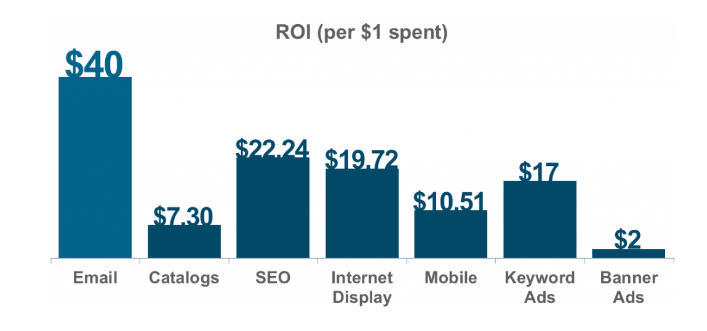
That's because the costs associated with these campaigns are low. You'll pay only a flat monthly or annual rate for your email software based on the number of subscribers you have.
Think about how much money it costs you to send direct mail letters to homes asking for donations.
You'll pay just a fraction of that cost by sending emails instead.
Plus, the best part about your email list is you know you're contacting people genuinely interested in your organization. That's why they signed up to receive these messages in the first place.
Someone who opts in to receive your promotional content is much more likely to spend money than a person receiving a call from an unknown number.
Scammers have always tried to trick people. The modern age is no exception.
It's a sad reality, and it's unfortunate it happens often.
As a result, consumers protect their information. If they've never heard of your nonprofit organization, they may not feel comfortable donating to you or buying from you for the fear your organization is not legitimate.
But you can do a few things to change that. Understand the top elements that add credibility to your website:
For starters, you need to make it easy for people to contact you through:
All of these need to be easily accessible.
Make sure you include security badges on your website as well. Proofread your site for grammar issues and typing mistakes. Such errors can make you appear unprofessional.
Your checkout and donation processes need to be secure. I'll talk more about the way you accept payments shortly.
Both your current and prospective customers are active on social media. The same holds true for your donors and volunteers.
You need to be active on these platforms.
If you don't have profiles created on social sites, you need to do this as soon as possible. Facebook. Twitter. Instagram. YouTube. These are the best places to start.
Check out the Facebook page for Save the Children:
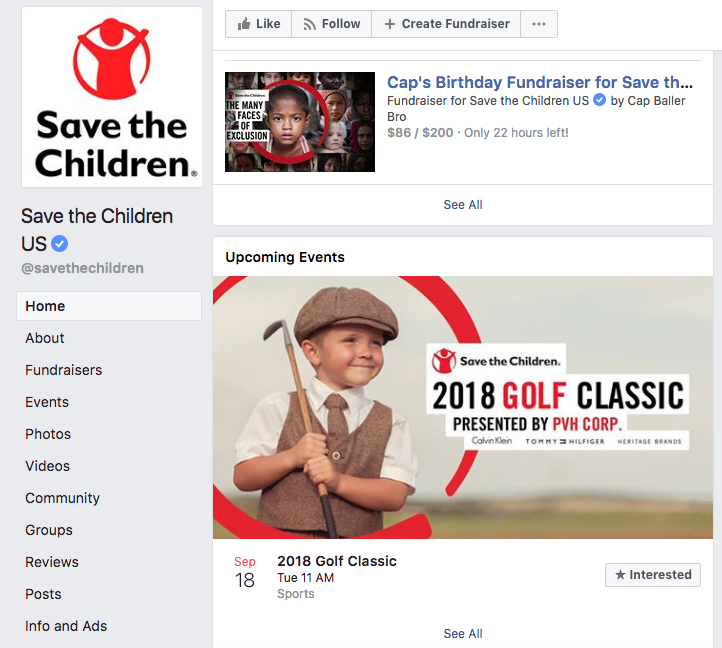
As you can see, the organization uses this marketing channel to promote events and raise money for specific causes.
Post content on your social media profiles on a daily basis.
Try new strategies to increase the number of your social followers. Interact with these followers. Run promotions and giveaways to create exposure.
Social media platforms are great places for you to explain your cause.
Also consider using social media platforms to encourage customer referrals.
Let's say someone decides they want to buy something or make a donation on your website. That's great news.
But they see you accept the payment only through mailed checks or over the phone. That's no good.
You need to accept payments online. But take your online payment concept one step further.
Accepting only Visa and Mastercard won't maximize your profits. You can't assume everyone has those cards. Even if they do, the cards may not be their preferred methods of payment.
You need to accept all major credit cards and debit cards.
Furthermore, you need to accept alternative payment options as well, such as PayPal, Apple Pay, and Venmo.
The more options you have available, the more likely people will buy and donate.
Master the art of storytelling.
The whole idea behind your nonprofit needs to be the driving force of your sales. Sell your story, not your product.
You'd be surprised how impactful your story can be. People care about the world. Just look at these numbers based on a recent survey of Generation Z:

Younger generations are especially aware of social concerns across the globe.
That's why 70% of Millennials say they are willing to spend more money on brands supporting a cause.
Explain why you got into business in the first place. Whom are the proceeds helping? How will donations help those in need?
Elicit an emotional response from people who hear your story. The message needs to be loud and clear.
This story needs to consistent on all your marketing channels. Feature it on your website, social platforms, and email newsletters.
You should also give people the opportunity to share their stories. This will help create a sense of community and give people a reason to constantly visit your website.
For example, let's say your nonprofit helps people who have a certain illness. Let people currently suffering from that illness share their stories. They can connect with other people in the same position.
Family members and friends of those with the illness can contribute as well.
By creating this community of people with unique stories, you will encourage more people to support your cause.
Your nonprofit organization needs to have a mobile website. As we saw earlier, more than half of nonprofit website traffic comes from mobile devices, and one in five nonprofit event registrations occurs on a mobile device.
If your site isn't mobile-friendly, you'll have high bounce rates and won't get high conversions.
But if your site loads quickly and is mobile-optimized, you'll have a better chance of making more money.
Take your mobile marketing efforts one step further by creating a mobile app for your nonprofit.
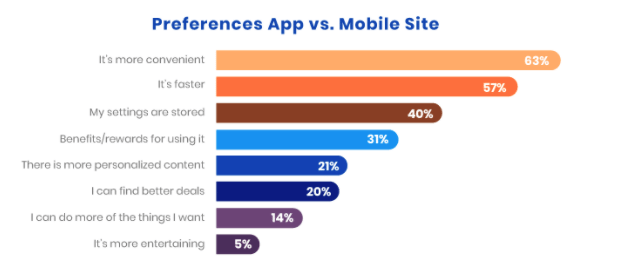
As you can see from the data above, consumers prefer mobile apps to mobile websites for several reasons:
These are the components you need to focus on if you want to drive sales and donations through your mobile app.
Creating a mobile app also improves your legitimacy, which I discussed earlier. It will be easier for people to find you when they browse for related content in the app store.
You can use your nonprofit mobile app to accept payments.
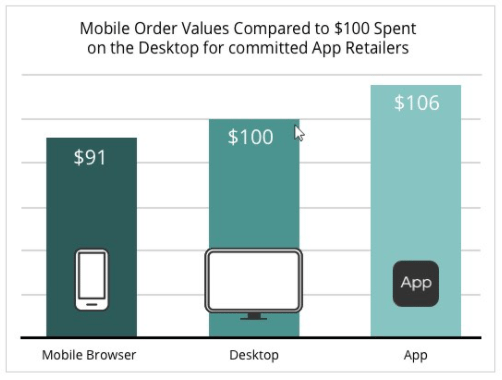
People spend more money on mobile apps than they do on mobile browsers and desktop devices.
This strategy will not only increase the number of donations you get but also the amount of each donation.
Leverage relationships to expose your brand to a wider audience.
Get a well-known brand to sponsor an event or partner with your company. Lots of businesses will be willing to do this because it shows they are charitable as well.
Their customers can ultimately become donors for your nonprofit. You can accomplish this in many ways. It depends on what your sponsor is willing to offer.
For example, if people make a donation through your website, they could get a discount or gift card to the sponsor's business.
You should also partner with social influencers and celebrities.
This is another great way to add credibility to your organization. Social media promotions from well-known personalities promoting your nonprofit will help you drive sales and donations.
Try to find someone who has a direct connection to your mission and cause. These people will be much more willing to help you.
Nonprofit organizations still need to make money.
You can do this without straying away from your primary company's goal and mission. All this means is your cause will get even more support from your brand.
Focus on new ways to acquire customers and donors. Take advantage of digital marketing tactics to do this.
Drive traffic to your website, and encourage donations through that platform. This will be easy to do if you establish credibility.
Build an email subscriber list. Stay active on social media. Leverage your mission statement and story to drive donations.
Make sure you have a mobile website. Launch a mobile app to take donations from there as well. Accept as many payment methods as possible.
Find a celebrity or social influencer willing to support your cause and promote your nonprofit.


